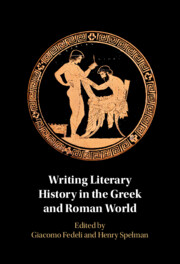Book contents
- Writing Literary History in the Greek and Roman World
- Writing Literary History in the Greek and Roman World
- Copyright page
- Contents
- Contributors
- Introduction
- Part I Between Literature and Scholarship
- Chapter 1 Writing the Beginnings of Greek Literary History
- Chapter 2 Contrasting Pairs and Twin Graves
- Chapter 3 Ancient Histories of Satire(s)
- Chapter 4 Cicero as a Literary Historian
- Chapter 5 Varro and the Spirits of Rome’s Literary Past
- Part II Lives and Afterlives
- Part III Narratives of Change
- Epilogue
- Afterword
- Bibliography
- Index Locorum
- Index of Subjects
Chapter 5 - Varro and the Spirits of Rome’s Literary Past
from Part I - Between Literature and Scholarship
Published online by Cambridge University Press: 07 June 2024
- Writing Literary History in the Greek and Roman World
- Writing Literary History in the Greek and Roman World
- Copyright page
- Contents
- Contributors
- Introduction
- Part I Between Literature and Scholarship
- Chapter 1 Writing the Beginnings of Greek Literary History
- Chapter 2 Contrasting Pairs and Twin Graves
- Chapter 3 Ancient Histories of Satire(s)
- Chapter 4 Cicero as a Literary Historian
- Chapter 5 Varro and the Spirits of Rome’s Literary Past
- Part II Lives and Afterlives
- Part III Narratives of Change
- Epilogue
- Afterword
- Bibliography
- Index Locorum
- Index of Subjects
Summary
Throughout Varro’s fragmentary corpus is a seeming obsession with textual afterlives, his own as well as of others. This was not merely a literary trope, but an idea grounded in Neoptolemus of Parium’s ars poetica and its counter-intuitive definition of ‘poet’. In his theory of poetry, ‘poet’ refers not to the historical poet who creates a poem, but to the meaning or ‘mind’ of a poem, and this ‘poet’ (the poet scriptus) acquires an immortality denied to the flesh-and-blood poet (the poet scribens). Varro’s approach to literary history is informed by this definition of ‘poet’, and when he writes about Rome’s literary past, his interest is less in biographical data about historical poets than in poetic self-preservation through mimesis. An examination of fragments from the De poetis, the De poematis, the De comoediis Plautinis, and the poetic epitaphs preserved in Gellius demonstrates how Varro’s interest in literary immortality and mimesis was misread as literary history in the narrow sense.
- Type
- Chapter
- Information
- Writing Literary History in the Greek and Roman World , pp. 108 - 128Publisher: Cambridge University PressPrint publication year: 2024

